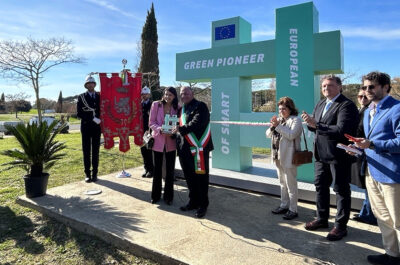The Commission's investigation found that the aid helps to improve regional connectivity and the decongestion of bigger airports such as Schiphol, in line with EU transport policy objectives.
The European Commission has found that operating aid totalling 19.2 m. euros in support of operations at Groningen Airport Eelde is in line with EU state aid rules. The state aid granted by The Netherlands will improve the region’s connectivity and the decongestion of bigger airports without unduly distorting competition in the Single Market.
Commission Vice-President in charge of competition policy Joaquin Almunia said: “Today’s decision is the first to be adopted under the new EU guidelines on state aid to airports and airlines, which entered into force on 4 April 2014. The case of Groningen airport shows that operating aid granted for a transitional period can be combined with incentives for small airports to increase their efficiency, adjust their business model and to eventually become profitable.”
Groningen Airport Eelde is an airport with around 200 000 passengers per year. Since 2001, the Dutch authorities have subsidised the operation of the airport with yearly amounts fixed in advance that were paid to the company partly upfront and partly in annual instalments.
The Commission’s investigation found that the aid helps to improve regional connectivity and the decongestion of bigger airports such as Schiphol, in line with EU transport policy objectives. Moreover, the aid provided an incentive to Groningen airport to adapt its business model and rationalise its operations in order to become profitable in the long term. Indeed, the aid amount was calculated on the basis of a business plan according to which breakeven would occur in 2017. The objective of this measure was to phase out operating aid to Groningen airport entirely by 2016 and to give the airport time to attract traffic in order to grow. At the same time, the potential distortions of competition brought about by the aid are limited, because there are no other airports within Groningen’s catchment area (i.e. not within a distance of 100 km or 60 minutes travelling time by road).
The Commission therefore concluded that the measure was in line with the 2014 guidelines on state aid to airports and airlines (IP/14/172 and MEMO/14/121). This was the first case where the Commission applied the new guidelines to state aid covering the operating costs of airports (so-called “operating aid”). The new guidelines enabled the Commission to approve operating aid for this small airport, which is important for mobility in the provinces of Groningen, Friesland and Drenthe.
Commission approves 12.7m. euros Italian investment aid for Verona and Brescia airports
The European Commission has found that a 12.7 million euros capital injection into the company managing the Italian airports Verona and Brescia, Aeroporto Valerio Catullo di Verona Villafranca S.p.A, was in line with EU state aid rules. The measure aimed at enabling the company to carry out infrastructure investments over a period of ten years. The Commission concluded that these investments will improve the mobility of citizens and meet transport needs in northern Italy, in line with EU transport policy objectives and without unduly distorting competition in the Single Market.
The Italian authorities notified the capital injection in February 2014 Aeroporto Valerio Catullo di Verona Villafranca S.p.A, which is majority owned by public local entities, manages Verona airport with approximately 3 million annual passengers, and the airport of Brescia, a small regional airport with less than 1 million annual passengers, specialised in cargo transport. The measure’s objective is to strengthen the company’s capital base so that it can undertake infrastructure investments at the two airports in the period 2012-2021, including a terminal upgrade and extension, aircraft apron extension, requalification of air-side and taxiway facilities, ramp facilities and safety improvements.
The capital injection had been granted in 2012, in breach of the Member States’ obligation to notify state aid to the European Commission before it is granted. However, the Commission assessed the compatibility of the investment aid with the then applicable guidelines on state aid to airports and airlines (the 2005 Aviation Guidelines). The investigation showed that the supported infrastructure projects contribute to an objective of common European interest by improving the accessibility of the region, tackling congestion of existing airports, and enabling the airports to meet passenger and cargo transport needs in northern Italy.
Furthermore, the Italian authorities presented a business plan which showed that the public support was necessary to implement the project because the expected benefits would not cover the investment costs. The aid was also proportional to the objectives pursued, as it was limited to the funding gap. Finally, the Commission concluded that the measure will not lead to a significant distortion of competition. Indeed, there is only a limited overlap with the catchment area of neighbouring airports and the planned investments will help decongesting the neighbouring airports.
Commission approves aid scheme for airlines launching new routes to Canary Islands
The European Commission has found that a Spanish scheme aimed at providing “start-up” aid to airlines launching new routes to the Canary Islands is in line with EU state aid rules. The Commission has concluded that the project will boost the economic development of the region, in line with EU objectives, without unduly distorting competition in the Single Market.
The scheme aims both to support the further development of the tourism sector in the Canary Islands, and to improve connections with this remote region. It is also expected to create jobs.
The scheme will allow the Canary Islands regional government to subsidise up to half of the airport charges paid by airlines for the operation of new routes to the islands for a period of up to three years. The new routes must be genuinely new routes to destinations not currently connected to the Canary Islands. The destinations do not necessarily have to be inside the EU, and therefore the scheme will allow the region to achieve a greater geographical diversification of its tourism sector, and rely less on its traditional markets. The aid will be granted to airlines following a call for proposals. The total budget is for up to 10 million euros until the end of 2017.
This is the first start-up aid scheme that the Commission has assessed under its new guidelines on state aid to airports and airlines which came into force on 4 April 2014 (see IP/14/72). The guidelines have simplified the rules on public support granted by Member States for the start-up of new air transport routes.
The scheme allows the granting of aid up to 50% of the costs (so-called “aid intensity”) for a maximum duration of three years, in line with the guidelines. Airlines are required to submit business plans to demonstrate how the new routes will become profitable after the aid period has expired.
This scheme provides a good example of state aid which is useful for the development of remote regions while keeping distortions of competition to a minimum. The Commission’s guidelines encourage this type of aid.
Photo caption: Groningen Airport.
Tatiana is the news coordinator for TravelDailyNews Media Network (traveldailynews.gr, traveldailynews.com and traveldailynews.asia). Her role includes monitoring the hundreds of news sources of TravelDailyNews Media Network and skimming the most important according to our strategy.
She holds a Bachelor's degree in Communication & Mass Media from Panteion University of Political & Social Studies of Athens and she has been editor and editor-in-chief in various economic magazines and newspapers.


























































































































































































